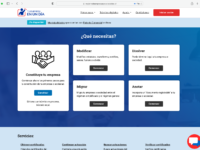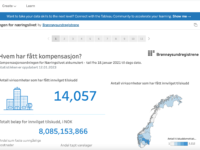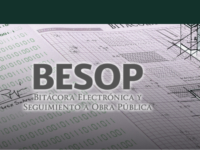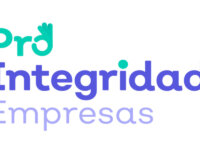The Ministry of Economy has piloted a web-based module that integrates a Business License application into the national Business Registry to incentivize businesses to apply for a license online, right after incorporating and obtaining a tax number. This innovation provides undigitalized municipalities an online channel with standard requirements for businesses in their jurisdictions, while gaining a free web-based back office workflow, with trusted digital legal and tax information to ease…
Innovation Tag: Anticorruption and Integrity
The digital compensation scheme was created to support Norwegian businesses to endure the financial consequences of the Covid-19 pandemic. The scheme designed was quick, efficient, and can be relaunched when needed. Checks are done before the disbursement, which minimizes the need for verification afterwards and also prevents misconduct. Applications are approved by an auditor, and then automatically processed and checked against information from a variety of sources and registers. Information…
The innovation was developed to strengthen the Secretariat of Public Function of the Federal Government's powers in terms of real-time monitoring, control and auditing of procurement contracts carried out by public sector agencies and entities. BESA is an online tool that monitors, from start to finish, compliance with contracts for goods and services. It seeks to identify and eliminate bad practices that the public sector carries out during the execution of procurement contracts.
The Disciplinary Maturity Model (CRG-MM) is a pioneer model in Brazil and is an operational and strategic tool aimed to evaluating and improving the management of disciplinary activity, through the definition of quality standards based on management and public governance procedures. This innovation seeks to provide greater stability and security to executors and managers of disciplinary activity, considering its role as a public integrity instance in the fight against corruption.
The Information System for Monitoring the State Anti-Corruption Program (country's Integrity Program) was developed to effectively address the challenge of monitoring the Integrity Program. This innovative solution simplifies and streamlines the processes related to the Program's implementation, ultimately leading to more effective governance. Primarily, considering the OECD's Recommendations on Public Integrity, which highlight that traditional approaches relying on strict rules and law…
The implementation of the OKRs (Objectives and Key Results) methodology in the National Agency on Corruption Prevention (NACP) was developed to address performance management, transparency, and team clarity and coordination issues. OKRs have benefited the organization by providing a structured framework to set, track, and measure objectives, thus improving accountability and goal alignment. This marks the first experience of implementing this approach in the Ukrainian public sector, drawing…
Enhanced access to public service delivery for citizens forms the very core of good and responsive governance. However, this often becomes a challenge, as, accessing government services can be a hassle for citizens. Citizens can experience long queues at government offices, inconsistencies in the required documentation, among others. ‘Doorstep Delivery of Public Services’ was designed to solve this problem. The program allows citizens to access government services from the comfort of their…
The Pro Integrity Badge (Distintivo Pro Integridad) of Jalisco's State Comptroller's Office (Contraloría del Estado de Jalisco) is a badge that is awarded to companies that prove they have an integrity policy defined as the set of self-regulation elements and internal controls that allow mitigating and reducing corruption risks, as well as guaranteeing a culture of integrity within companies and organizations.
Case Study
The multi-country PALOP-TL eBudget CSO Digital Platform for transparency & accountability
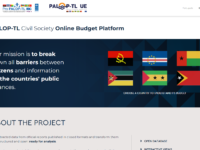
Civil Society Organisations and Ministries of Finances from the PALOP-TL countries (Angola, Cabo Verde, Guinea Bissau, Mozambique, São Tomé e Príncipe, Timor-Leste) developed the 1st ever transnational digital network for citizens’ fiscal literacy and participation in budget cycles. The Digital Platform uses data transparency tools with pictographic representation to simplify complex budgetary documents for the wider public, increasing transparency and accountability in public finance…
In 2016, Ukraine launched an electronic asset declaration system, requiring public officials to disclose earnings and assets, in an effort to combat corruption and enhance accountability of public figures. With support from international partners, the e-register system hosts a global database of assets of public officials and has over 1,450,000 registered users.

